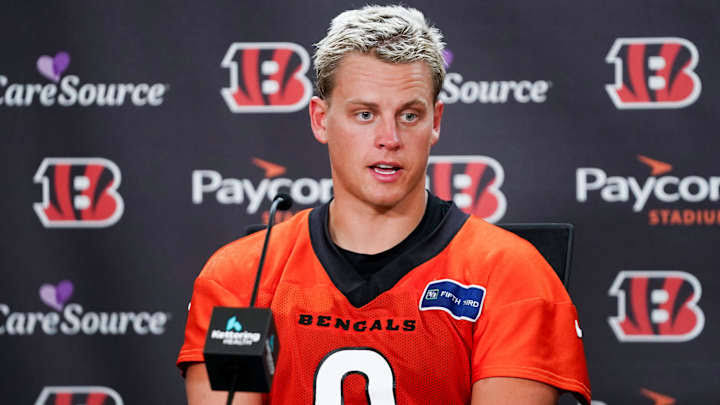For the Kids: A Story of Heart and Hustle
The pen in his hand felt heavier than it should’ve. Maybe it was nerves, or maybe it was the surreal weight of the moment pressing down on his shoulders. Jamal Rivers had just signed a four-year, multimillion-dollar contract with the Cincinnati Bengals. A dream inked in black and white on NFL stationery.
Reporters buzzed in the background. Cameras clicked. The PR staff was already preparing his introduction tweet. His agent clapped him on the back, congratulating him, but Jamal’s mind was already somewhere else.
Across the city, in a quieter part of town, a little girl named Kayla was fighting her own battle—a rare form of leukemia. Jamal had met her six months ago when he volunteered at the Cincinnati Children’s Hospital during his final year at Ohio State. She had big brown eyes, the widest smile, and enough courage to fill a stadium. That day, she’d told him she wanted to be a soccer player when she grew up.
“You will,” he had said, holding her tiny hand. “You’ll outrun everybody.”
But Kayla’s condition had worsened. Treatments were expensive. And not every family had the means to face those mounting costs.
So while the ink was still drying on his contract, Jamal leaned over to his agent and said, “I want to donate my signing bonus.”
His agent blinked. “What do you mean? Like a part of it?”
“All of it,” Jamal said.
“You’re talking about seven figures. You’ve got taxes, family needs, your future—”
Jamal raised a hand. “I know. But this isn’t about me.”
The next morning, headlines exploded:
**”Rookie Star Donates Entire Signing Bonus to Cincinnati Children’s Hospital”**
**”Jamal Rivers: Bengals New Hero On and Off the Field”**
**”‘Your Kids, Our Future’—NFL Player Sets Example for All”**
Twitter was ablaze. Former players, celebrities, even the league commissioner tweeted their admiration. But Jamal wasn’t looking for attention. He didn’t need praise. He had grown up in a neighborhood where generosity wasn’t about how much you had, but how much you were willing to give. His mother had once given away their last gallon of milk to a neighbor who had kids to feed. “We’ll figure it out,” she’d said.
Jamal had never forgotten that.
—
The press conference was packed. Reporters asked the usual questions about how it felt to go pro, what he hoped to accomplish on the team, how he was preparing for his first season. Then one reporter, a young woman from a local station, leaned in and asked, “Why give it all away?”
Jamal paused. The room went still.
“Because I can,” he said. “Because I remember being the kid who didn’t have much. Because I remember what it felt like to sleep on a couch while my mom worked double shifts to keep the lights on. And because there are kids in this city who are fighting for their lives every day—and they deserve a shot. They are the future. All of them. And if I can use what I’ve been blessed with to help even one of them? Then I’m already winning.”
—
A few weeks later, Jamal visited the hospital again, only this time not as a volunteer, but as someone who’d just transformed the pediatric oncology ward with his donation. New equipment, upgraded facilities, more staff, and even a therapy dog program—it was all in motion.
And Kayla was still there. Still smiling.
She wore a Bengals jersey with *RIVERS #14* printed across the back.
“Look what I got!” she said, holding up a photo of her standing next to her nurse, holding a football. “I’m gonna get better. Then I’m gonna play soccer AND football!”
Jamal knelt beside her bed, grinning. “You do that, and I’ll come cheer for you in both games.”
“You better,” she said, mock-serious. “I’ll need fans.”
He laughed. “You’ve already got a whole city behind you.”
As he left the room, one of the nurses pulled him aside, tears in her eyes. “What you did… it’s saving lives, Jamal. I hope you know that.”
“I do,” he said. “But we’re just getting started.”
—
That season, Jamal showed up to training camp early every day. He studied the playbook like scripture. And when he finally stepped onto the field in Week One, the crowd roared—not just for the player, but for the man.
He had 112 yards and a touchdown in his debut. But more than that, he wore cleats custom-painted with images of children from the hospital. Every game, he carried them with him—on his feet and in his heart.
The Bengals made the playoffs that year. And while Jamal was becoming a household name across the country, he remained the same kid from Dayton who had always believed success wasn’t just measured in touchdowns or trophies—but in impact.
—
One night after a Monday night win, he posted to his social media:
**“Just gave my entire signing bonus to the Children’s Hospital in Bengals. Your kids, our future. Let’s keep pushing for greatness—both on and off the field.”**
It went viral.
But Jamal didn’t log on to read the comments. He was at home, sitting quietly on his porch, sipping tea with his mom. The stars were out. The cicadas hummed in the dark.
“You’ve made me proud, son,” she said, touching his shoulder.
“I’m just getting started,” he replied.
She smiled. “Then keep going. The world needs more of that.”
And he would.
Because greatness wasn’t just what you did on the field—it was what you left behind when the lights went out.
e a version tailored to a real-life player, or expanded into a full short story or screenplay!
